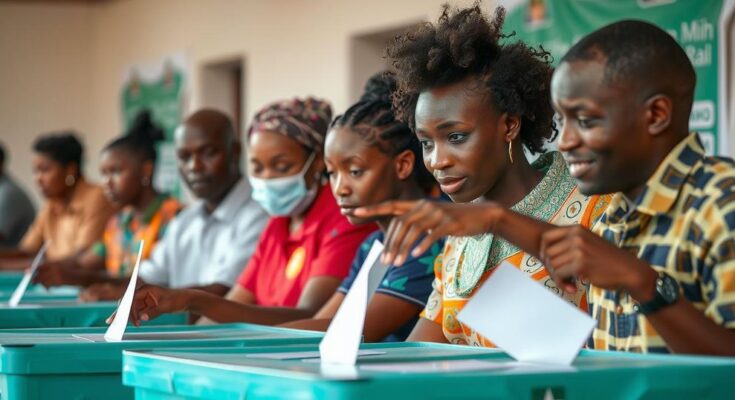Ghanaians are set to vote in a critical election as they face an economic crisis with a focus on two leading candidates: Vice President Mahamudu Bawumia and former President John Mahama. Key issues include inflation, unemployment, and illegal mining. The election is crucial for shaping the country’s future amid growing demands for change, with more than half of the population registered to vote.
On Saturday, Ghanaians will cast their votes in a crucial presidential election amidst a significant economic crisis. Twelve candidates are contesting, primarily representing the ruling New Patriotic Party (NPP) and the opposition National Democratic Congress (NDC). Current Vice President Mahamudu Bawumia, aged 61, and former President John Mahama, aged 66, are the leading figures, with Mahama aiming for a return to office reminiscent of U.S. President Donald Trump’s successful comeback. Economic turmoil, elevated poverty rates, and issues surrounding illegal gold mining, known locally as “galamsey,” are central to voters’ concerns, as illustrated by the assessments of experts like Economist Godfred Bokpin and Political Scientist Kwame Asah-Asante.
Economic challenges are exemplified by soaring inflation rates, which peaked at 54.1% last December, and a surge in youth unemployment, affecting over 1.3 million individuals aged 15 to 35. The World Bank reports a worsening economy post-COVID-19, marked by high food prices and reduced living standards. Bawumia, a trained economist who has overseen economic management, faces criticism regarding his handling of the economy, as opposition candidates leverage these issues against him. Despite notable economic setbacks, his camp points to achievements in infrastructure and job creation, emphasizing their efforts to mitigate economic decline.
Conversely, Mahama advocates a “reset” of governance, promising efficient governance, tax reductions, and stringent mining regulations, while criticizing the current administration’s economic policy. As the electorate seeks transformative solutions, more than half of Ghana’s 34 million citizens are registered to vote, indicating a desire for change. The election will also include the parliamentary vote, with candidates needing over 50% of the votes to secure victory, potentially leading to a run-off.
As the voting day approaches, observers anticipate a tightly contested election but remain hopeful for a peaceful outcome that respects Ghana’s democratic traditions. Political analyst Kwame Asah-Asante expressed optimism regarding the electorate’s commitment to democracy and adherence to the electoral process, underscoring the importance of continued institutional stability.
Ghana is currently facing its most significant economic challenges in decades, leading to heightened tensions as citizens prepare to vote. Following the completion of two terms by President Nana Akufo-Addo, the country is navigating issues such as inflation, rising poverty, and unemployment. The upcoming election is not only a decision about leadership but also a referendum on how the current government has managed these intertwining crises. With multiple candidates vying for the presidency, economic and environmental concerns will heavily influence voter behavior, as candidates present their proposals for recovery and sustainable futures.
In summary, the forthcoming presidential election in Ghana arrives against a backdrop of severe economic distress and societal demands for reform. The primary contenders, Mahamudu Bawumia and John Mahama, illustrate contrasting approaches to governance and economic management, indicating a pivotal moment for the nation’s political landscape. As the electorate prepares to voice their opinions, the outcome could either reinforce the current administration or usher in significant changes under new leadership, continuing Ghana’s commitment to democracy and peaceful transitions of power.
Original Source: www.cnn.com




